Oracle Fusion technical interview questions
Question 1:
What is My Folder and Shared Folder in Oracle Fusion BIP Reports?
Answer:
My Folders:
'My Folders' is your own folder. It means it is specific to each user. when you will create your report under this folder then no one in the application can see and access these reports because these are saved and created under your My folder. so this is totally yours personal Development.
Shared Folders:
Shared Folders is your Application Common Folder. It means it is shared across users of the application as per the roles. Shared folders have many Sub-folders related to the Work related and Module Related.
Oracle has already given standard OTBI reports, Data Models and Dashboards under the sub-folders in the Shared Folders. When you will create any report under the sub-folder of Shared Folders then your report will be visible and accessible to other users of the application as per the Permission and role of that user.
Question 2:
Which are the User roles Available in Oracle Fusion?
Answer:
Oracle Fusion has provided these four Types of roles.
Abstract role
Job roles
Duty roles
Data roles
Question 3:
Can we customize the Standard BIP report in Oracle Fusion?
Answer:
Yes, we can customize the standard BIP report in oracle fusion. Oracle fusion has provided the flexibility to customize the standard report in oracle fusion.
We can customize the Standard BIP report in two ways.
1. We can create the customize the complete standard report with different name.
2. We can customize the standard report itself using the xmlp server feature.
If you want to know the complete steps about report customization then please follow this below post.
https://rpforacle.blogspot.com/2019/01/how-to-customize-standard-reports-in-oracle-fusion.html
Question 4:
Types of Report trigger in Oracle Fusion BIP reports ?
Answer:
2 Types of Report Triggers in Fusion BIP Reports
before Data
After Data
Question 5:
Can we create the Lexical parameter in Oracle Fusion BIP reports ?
Answer:
We cannot create the Lexical Parameter in SAAS environment but PAAS and other cloud environments , we can create the lexical parameters for Fusion BIP reports.
Question 6
How to find the Descriptive Flex fields in Oracle Fusion application Pages ?
Answer:
We can find the Flexfields,
We have to go to Top right hand side of this web- Page and there you can see your login name and there you will see drop down option beside your login name.
you have to click this option as below. click on Highlight Flex Fields option.
After this we can see the Descriptive Flex fields available in Oracle fusion Application pages.
Question 7
How to get the Oracle Fusion application information’s in the BIP reports?
Answer:
In Oracle Apps R12 reports , we can easily get the user information through Profile option like USER_ID, RESP_ID but in Oracle Fusion to get the user information , we need to use fusion system variables as below.
System Variables Variables Description
xdo_user_name : User ID of the user submitting the report. Like Which fusion. User running this report
xdo_user_roles: Roles assigned to the user submitting the report. Like from Which role this report is running.
xdo_user_report_oracle_lang: Report language from the user's account preferences.
xdo_user_report_locale: Report locale from the user's account preferences.
xdo_user_ui_oracle_lang: User interface language from the user's account preferences.
xdo_user_ui_locale: User interface locale from the user's account preferences.
To Access these variables in fusion reports you need to user : and then System variable name in your SQL query.
Like
Select :xdo_user_name
:xdo_user_roles
From Dual
Question 8
How many Types of Roles Available in Oracle Fusion?
Answer:
Oracle has provided these four Types of roles.
· Abstract role
· Job roles
· Duty roles
· Data roles
Question 9:-
What is xmlp server in oracle fusion ?
Answer:
xmlp server , we do use in the report customization. If we want to customize the standard report in oracle fusion , then oracle fusion has provided the xmlp server feature for this.
Question 10:-
What is ucm in oracle cloud ?
Answer:
UCM is the Universal Content Management Server Available in Oracle Cloud. UCM is very important in Oracle Cloud SAAS Environment. If We need to do Inbound Integration or We are doing the Outbound Integration, UCM plays very important roles in that. In Cloud UCM is same like FTP server in Oracle Apps r12. Where we put the Inbound Files to process through by Oracle Concurrent Requests and to Generate the outbound files too which will be picked by some other system. In this Way, Oracle Cloud has already created different spaces in the UCM for different works. We Just need to Identify that space in UCM for our relevant work. Inside UCM , there are different Locations and each have different paths. We cannot create new locations or Path in the UCM. We need to use the existing locations under the UCM.
Question 11:-
Can we create the custom roles in oracle Fusion ?
Answer:- Yes, We can create the custom roles in oracle fusion. We can create the custom roles from the standard roles. We have the option to copy the standard role and then customize it as per the requirment.
Question 12:- How to Automate Data Import Process in Oracle fusion ?
Answer:
Oracle fusion has provided another scheduled process 'Load Multiple Interface Files for Import' in which you don't need to put select the file in this process.
Here you can see below , I have selected Import process 'Import Suppliers' and File Prefix 'PozSuppliersInt' then after that click on Advanced button above to schedule this process.
Question 13:- What are the FBDI Data Import Steps in Oracle Fusion ?
Answer:
FBDI Data Import Steps
Step-1:- Download template from Oracle Enterprise Repository (OER)
Step-2:-Prepare Data conversion file & generate .csv & .zip files
Step-3:-Upload the zip file to Oracle Cloud
Step-4:-Login to Fusion Applications
Step-5:-Submit the Load Interface File for Import process
Step-6:-Submit the product specific import job
Step-6:-Review output file for any errors.
Question 14:- What are the BI roles for BIP and OTBI report access in Oracle Fusion ?
Answer:
BI Roles For BIP and OTBI reports
BI roles uses for both BIP and OTBI reports. They grant access to Business Intelligence functionality, such as the ability to run or author reports
BI Consumer Role Runs Business Intelligence reports.
BI Author Role Creates and edits reports.
BI Administrator Role Performs administrative tasks such as creating and editing dashboards and modifying security permissions for reports, folders, and so on.
BI Publisher Data Model Developer Role Creates and edits Oracle Business Intelligence Publisher data models.
Question 15:-
What is Sandbox in Oracle Fusion ?
Answer:
In Oracle Fusion , We will Use Sandbox to do any kind of Personalizations or Extensions or Page layout changes in Oracle Fusion Web-pages. It means we need to create Sandbox first to make any changes in Oracle Fusion application in terms of Personalizations or Extensions. Then all the changes will be done under this sandbox and this is the important feature of the sandbox that , we can do the changes in the application without impacting the complete application so these changes will only apply under the sandbox and other users of the application will not see these changes until unless you have tested the changes under sandbox and publish this sandbox. Once you will publish the sandbox in fusion then all the changes under the sandbox will be published to all the users in the application.
This is really an good feature , because typically we do Personalizations and extensions in test environment and then after the testing we do the changes in Production but in sandbox feature , you can do the changes specific to the sandbox that will not impact to complete application and once you are completely sure about the changes then you can publish the changes under the sandbox.
Sandboxes allow customizers to make their changes in a segregated environment. Sandboxes keep the customization XML files stored in an MDS repository that is only available when you choose to work in that particular sandbox (this repository is separate from the repository that holds customizations).
Sandbox Settings -
You need to go top right side of the application under your user name.
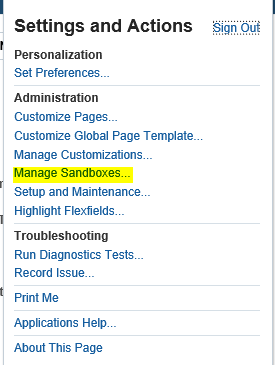 |
| Top 21 Oracle Fusion technical interview questions |
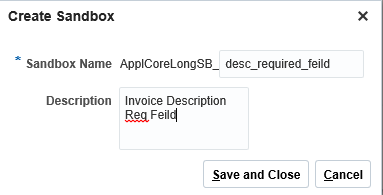 |
| Top 21 Oracle Fusion technical interview questions |
Question 17:- What is the Data loader tool provided by Oracle Fusion HCM ?
Answer:
Oracle fusion HCM has provided the HDL tool which helps to upload the HCM Related data in the Oracle Fusion. HDL full form is HCM Data Loader.
Question 19:-
What is Surrogate Id in Oracle Fusion HCM Loader ?
Answer:
Surrogate Id automatically generated at the time of creation of object in fusion. We can use surrogate Id to identify the created objects in oracle fusion hcm. Surrogate ID is the unique numeric value for that record.
(like for organization it is organization id , for job it is job id)
 |
| Top 21 Oracle Fusion technical interview questions |
Question 20:
How to Set the override email address in Oracle Fusion for All Email notifications in Oracle cloud ?
Step1:- Go to Setup and Maintenance roles.
Step2- Search the task 'Manage Expense Approval Rules'
Step3- In the BPM tool , Click on the User Name (on the top right side) which have a drop-down menu of 'Administration'
Step4:- In Administration , Scroll Down and go to 'Test Notifications Email Address' option. click on the Edit icon.
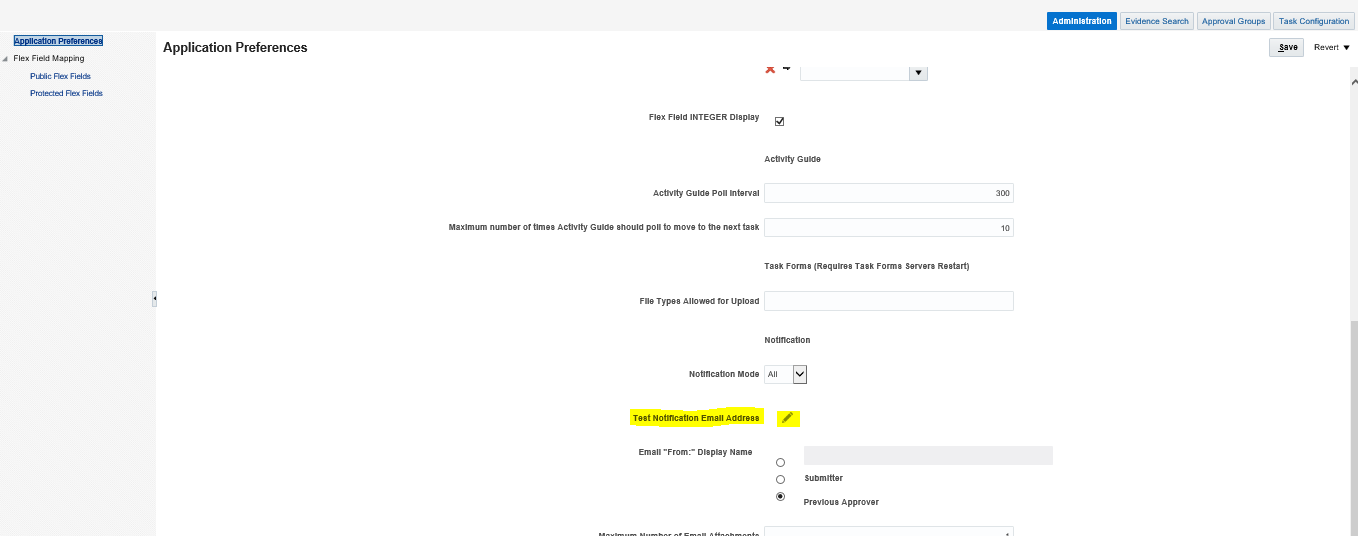 |
| Top 21 Oracle Fusion technical interview questions |
Question 21:-
What is Rapid Implementation? How Rapid Implementation works in Oracle cloud ?
Answer:
As I said , In Rapid Implementation , Oracle cloud has given Excel templates for different types of Oracle application business objects. So we need to prepare the data as per our business Requirment in these Excel sheets. Then An xml file can be generated once the user has filled out the required information on the spreadsheet.
The user can manually upload the generated xml file to the server from Oracle Scheduler. Then the upload process will create that business object in oracle application based on the information on the spreadsheet.
Rapid Implementation helps to upload the Very Basic information about business objects in oracle cloud application. If user wants to add more detail then the user may go through the original path to make changes or provide more details to that business object in application.
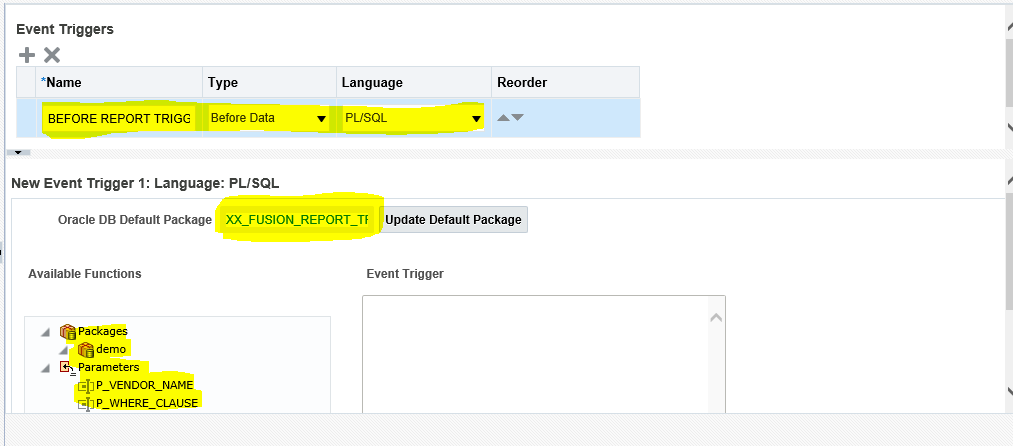
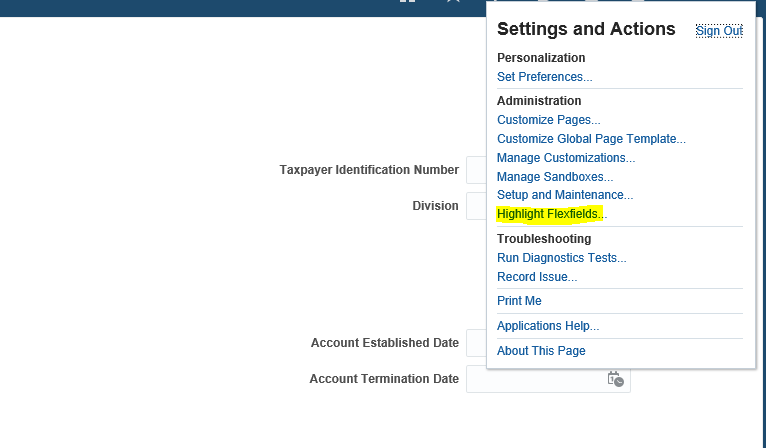








0 comments:
Post a Comment